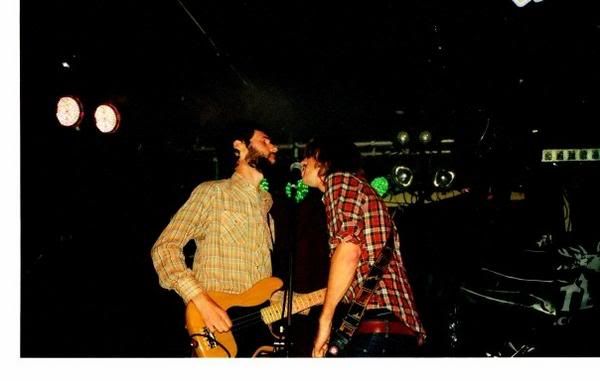
Easter. No work, no uni classes, carbs, chocolate, alcohol and I'm celebrating good Friday by going to see Taxi Driver at the Chauvel tomorrow night. I think it's better than Christmas.
Today's interview is taken from the same issue as the one with Her Faktory - the Obsessions issue - and it's with a really awesome band called the Wait Ups. How am I going to tie that in with Easter, you ask? Just watch me!
The Wait Ups have a song called 'It Ain't Over 'Til It's Over', which is most likely what Jesus was thinking when he came back from the dead. Which is why we celebrate Easter today. You like that? They don't call me Segue Jane for nuthin'.
--

Can't Sleep: Do you guys think it takes an obsessive person to want to write music? Do you think song writing is an act of obsession?
Nick: I'm pretty obsessed with writing songs, yea. (To Mike and Pete:) What about you guys? You aren't obsessed with writing songs, you never write songs.
Mike: I think it does, I think you have to have that (obsessive) thing in you.
N: I think it's more an obsession with having an outlet for the kind of things you don't want to talk about.
Pete:And you can be obsessive about songs, when you're writing a song, and if you're obsessive about it maybe that's not the best thing, you sort of have to finish it and let it go. So you're obsessive about it in the initial stages maybe, but when it's finished, that's it. You let it go, you move on to the next one.
CS: Do you think an obsession can ever be a healthy thing? Or is it just inherently unhealthy?
M: Of course it can be healthy.
N: I guess it depends what you're obsessed with. If you're obsessed with heroin, that would be...
M: Obviously very healthy.
N: Yea, extremely healthy. But if you're obsessed with, I don't know, banana smoothies...
CS: That's very unhealthy.
N: Yea. Well, it depends if you use yogurt or ice cream, I suppose.
CS: So, for example, the relationship between fans and musicians, do you think that's healthy?
P: It's not hurting anyone.
N: I've definitely been obsessed with a few musicians.
Which way would you say obsession goes? Is it a one way relationship or is there always a bit of give and take?
P: I think a lot of performers are obsessed with the idea of fans and...
M: Fans being obsessed with them, almost.
P: So it's probably not a bad thing that they have obsessive fans.
CS: So you think they sometimes encourage it?
M: Oh, absolutely.
N: Definitely.
P: I always think that the best bands have a cult following, usually. Not really a general, sort of semi-interested audience. The best bands usually have really obsessive fans.
N: Maybe not the largest fan base -
M: But one they keep forever.
N: Yea.
P: That's definitely the kind of band I obsess over, rather than just being vaguely interested in a lot of bands.
CS: So you think it's easier to obsess over a band if not as many people are into them? A lot of bands lose their old fans when they hit the big time...
N: Definitely. I think a lot of people get attached to a band, they feel they have some kind of possession over them, until they become really popular. Then they usually blame the band for changing.
CS: What is it in human nature that makes us want to obsess about things? Do you think we just get bored with our own lives?
N: I think there's an element of wanting to fantasise about having some sort of connection with a band, even though you don't. It probably makes you feel a bit better about yourself.
CS: So it's just a way of filling a gap in our lives?
N: Yea, probably.
M: I think so.
CS: Where would you draw the line between having a strong interest in something, and being obsessed with something?
N: If a band was playing four shows in a row, and you went to one show, that would be vaguely interested. If you went to two shows, then you're a big fan. But if you went to all four shows, you're a bit obsessed.
M: How many did you go and see?
N: Only two.
CS: Can I ask which band it was?
N: You Am I.
M:... And maybe stealing a poster from a learning institution. That would be a bit obsessive.
N: Maybe if you know every member of the band's birthday.
M: And bought them gifts.
CS: So it'd just be the amount that the interest intrudes into your own life?
M: Yea, if you start to include them in your life, I think that's where it starts to become a bit obsessive. Like if you're celebrating their birthday.
CS: Like they're a member of your family or something.
M: Yea. Or you start to talk about them by their nickname or something like that.
P: But when you're growing up, having bands that you strongly identify with is a good thing, I think, if you're a musician. All bands talk about being obsessed in one way or another with their favourite bands when they were a kid. I'd be worried if a band said they were never that into music (when they were young).
CS: I read an interview with Dappled Cities the other day, and they said they'd never listened to much music when they were a kid, and that's why they don't really have any obvious references. I thought that was a bit weird.
M: Yea... But it's obviously working for them.
N: But I guess your identity as a musician comes from all the obsessions that you had when you were growing up. Even if you don't want to admit that no one particular artist had a huge impression on the way you make music or write music; they probably have.
CS: What are your thoughts on hate just being another form of obsession? Do you think love and hate are two different extremes on the obsession scale, or are they more closely related?
P: There's a certain amount of passion involved in either one, it's pretty similar. In varying degrees.
N: I think sometimes people will pretend to hate something when secretly they're obsessed with it. They just don't want to admit it.
M: Like your guilty pleasure or something.
N: (To Pete): Like how you're listening to...
P: Lady GaGa
N: There we go.
CS: Everybody has Lady Gaga as their guilty pleasure!
P: I watched the new film clip today, she has a new album coming out. She's 23! She's only a year older than us!
CS: She's amazing... Do you guys have any current obsessions? Beside Lady GaGa?
N: (To Mike): You've been a bit obsessed with the Beatles lately.
M: Yea yea, that'd be true. I wasn't into them three months ago and now I know everything about them.
N: We've been obsessed with uni lately.
M: But that was forced upon us.
N: Yesterday I was just obsessed with consuming a lot of alcohol. What are you obsessed with, Pete?
P: I'm still thinking about Lady GaGa.
CS: Do you guys think it's natural to obsess about things? Is it just human nature, or is it a fault in our psyche?
N: I think pretty much everyone has an obsession about something. Like, people who are really high achievers; you wouldn't have high achievers in any field if they weren't people with obsessions.
M: I think it's the thing you obsess about that's the problem, not the obsession.
What do you think is the best way to get rid of an obsession?
N: Find something else to obsess about.
M: Yea, just moving on to a new obsession.
But that's not really getting rid of an obsession, it's just replacing it with another one.
N: Yea.
CS: So you think it's inevitable that we're always going to be obsessed with something?
P: If that's your personality type, yea I guess so.
N: Yea, I guess there isn't really any way of getting rid of one. That's just the way it goes.

